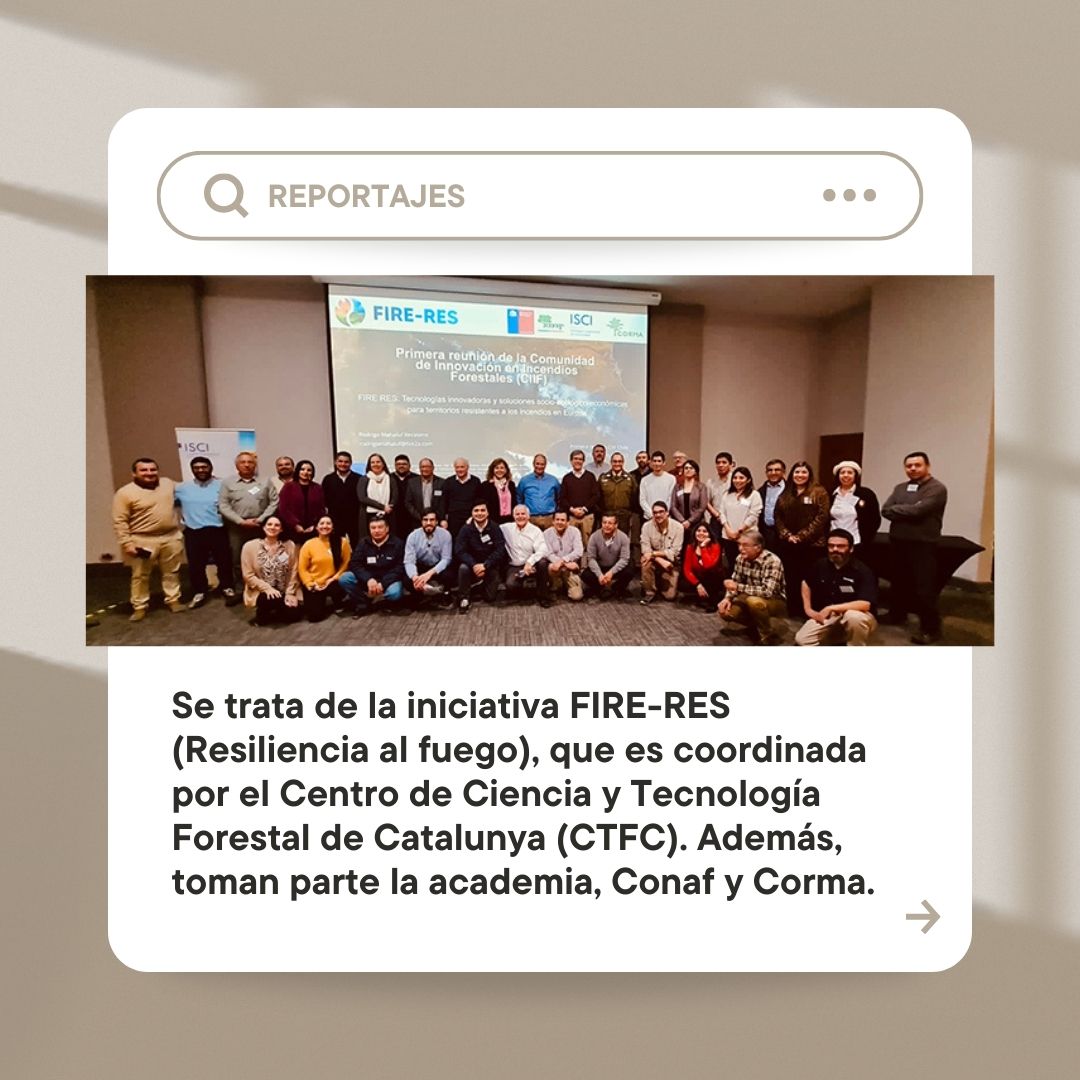Extreme wildfires are becoming a major environmental, economic, and social threat worldwide. As the limitations of fire suppression-focused strategies become evident, professionals, researchers, and policymakers increasingly recognize the need to develop new approaches that address the root causes and impacts of large-scale disasters.
FIRE-RES is a 4-year project (2021-2025) led by the Forest Science and Technology Centre of Catalonia (CTFC) in Spain and funded by the European Union's (EU) H2020 research and innovation program.
Chile is the only non-EU country participating in this project, which involves 35 institutions from 11 EU countries (Spain, Sweden, Norway, Bulgaria, France, Greece, Germany, the Netherlands, Portugal, and Italy) and has an investment of over €21.5 million for its implementation.
Resilience
The initiative aims to support the transition toward more resilient landscapes and communities in the face of Extreme Wildfire Events in Europe and beyond.
In this regard, Pablo Lobos Stephani, Manager of Forest Fire Protection at Conaf, explained that Chile was invited not only due to its experience with the 2017 wildfires but also because of the country's technical capabilities, particularly in analysis and prediction. "Since 2017, Conaf has shared knowledge and information, and institutional experts supported EU specialists in drafting the technical report that year. The corporation's main task falls under the project's first work package, which serves as a foundation for the future, where defining Extreme Wildfire Events (EWE) and using it as a central axis to address the challenge ahead is crucial," he stated."establishing the definition of Extreme Wildfire Events (EWE) and using it as the main framework to tackle the challenge we face," he explained.
Lobos Stephani emphasized thatit is highly important for Conaf to participate in this project after the latest wildfire season, as it allows analyzing data from this new extreme event, including specific causes, trends, and fire behavior.
"This information is valuable for planning prevention, mitigation, and response preparedness actions for such events. As is known, Chile involves many stakeholders in wildfire management, including the public, private, academic, and community sectors. The project'sIntegrated Wildfire Management (IWM) approach aligns well with Conaf's established work framework, incorporating planning across social, economic, cultural, and ecological dimensions," the Conaf expert highlighted.
He clarified that IWM is based on four pillars: extreme wildfire behavior and causes, emergency management, landscape and economy, as well as governance, society, communication, and risk awareness.
Within the project,FIRE-RES will develop, deploy, demonstrate, and enhance 34 innovative solutions to address the challenges posed by extreme wildfires.
These actions will be tested in real-world conditions across 11 "Living Labs," located in diverse regions across Europe and beyond, with Chile being the only lab outside Europe.
Here, Conaf collaborates with the Institute for Complex Engineering Systems (ISCI) and the Chilean Wood Corporation (Corma). The Biobío Region serves as LL-Chile, where 4 of the 34 aforementioned innovative solutions will be implemented.
Therefore, Pablo Lobos Stephani, Manager of Forest Fire Protection at Conaf, noted that both intermediate and final results of this project are important to analyze, as while the focus is on the EU, the issue of extreme wildfires is global, and Chile can draw valuable insights for future work strategies.
Decision-Making
Meanwhile, Ramón Figueroa Lizana, Head of Forest Protection at Corma, remarked that it is positive for Chile—despite not being one of the largest forestry nations—to have a strong industry and participate in this project, especially given the 2017 experience.
"Additionally, we have endured a 15-year drought and harsh climate change impacts, as we lack a continental climate and instead have a maritime one. We must decisively face what lies ahead, as Chile will be among the most affected by climate change and other challenges," he stated.
Regarding the Biobío Region, he affirmed that being part of FIRE-RES is significant, as Corma has major operational involvement here, and the project's findings will benefit not only the forestry macrozone but also provide a comprehensive wildfire perspective globally. "Wildfires are here to stay, and with climate change, fuels will become more aggressive due to drought. In Chile, nearly all wildfires are human-caused, making us a case study—with 7,000 emergencies annually. The key issue is occurrence, as forests are the victims, just like us," Figueroa Lizana explained.
Thus, he added, "We must understand that without integrated teamwork, damages will be far worse. This season, some fires spread at 18 km/h—something impossible to combat."
He stressed that FIRE-RES aims for resilient, fire-prepared communities and forests capable of self-protection and fire resistance. "That’s why investing in this project is crucial—it holds the future of how we coexist with wildfires," he noted.
The academic perspective came from Andrés Weintraub, professor and researcher at the University of Chile and ISCI, who highlighted the group's diversity: "There are few places in the world where such a diverse and qualified team can be assembled. Together, we aim to identify what we know isn’t working, where we want to be, the gaps between these points, and the actions needed to bridge them."







Comments (0)
No comments yet. Be the first to comment!
Leave a comment